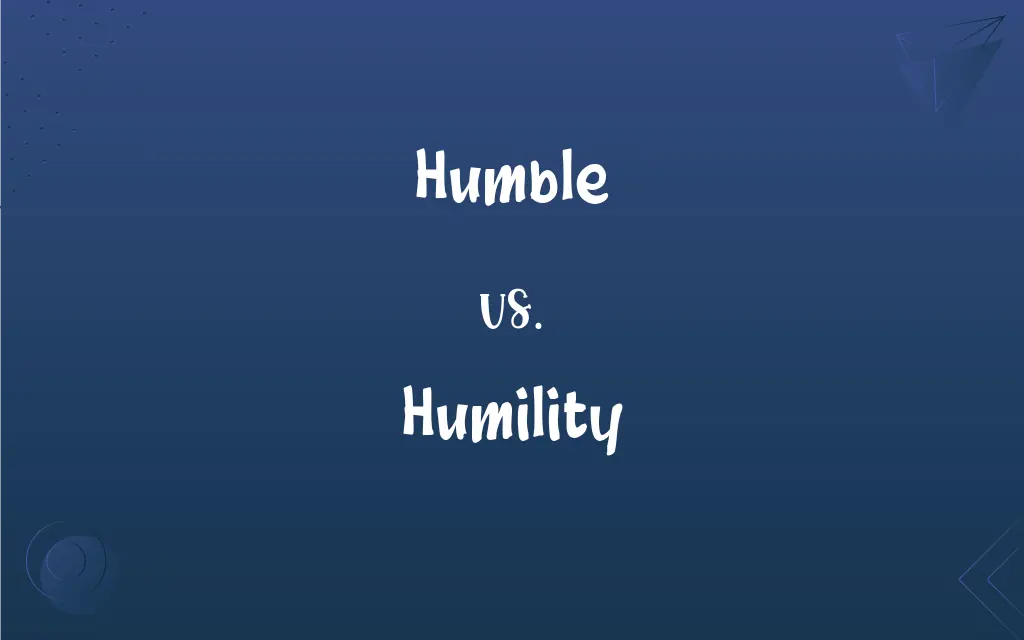Humble vs. Humility: What's the Difference?
Edited by Aimie Carlson || By Janet White || Published on January 6, 2024
Humble refers to a modest or low view of one's importance, while humility is the quality of having a humble disposition or attitude.

Key Differences
Humble is an adjective describing someone with a modest opinion of their own importance. Humility, a noun, refers to the quality or state of being humble.
Being humble often manifests in behavior, like downplaying one's achievements. Humility, however, is the overarching characteristic that encompasses such behaviors.
The term humble is used to describe individuals or actions, as in "a humble gesture." Humility is used to discuss the concept or trait, as in "She shows great humility."
Humble can be perceived through specific actions or words that demonstrate modesty. Humility is the internal quality that drives these humble expressions.
One can work on being more humble in certain situations. Developing humility involves a deeper, more consistent cultivation of this character trait.
ADVERTISEMENT
Comparison Chart
Part of Speech
Adjective
Noun
Definition
Modest, not arrogant or prideful
Quality of being humble
Usage
Describes actions, attitudes, or individuals
Refers to the trait or state of being humble
Manifestation
In specific actions or words
As an overarching character trait
Cultivation
Can be situational or behavioral
Involves deeper, personal development
ADVERTISEMENT
Humble and Humility Definitions
Humble
Lacking pretension or vanity.
She lived in a humble home, uninterested in material luxuries.
Humility
The quality of having a modest view of one's importance.
His humility is evident in how he respects everyone's opinions.
Humble
Not proud or arrogant; modest.
He was humble in accepting the award, giving credit to his team.
Humility
Freedom from pride or arrogance.
Her humility was refreshing in an industry often dominated by egos.
Humble
Showing a modest or low estimate of one's importance.
Despite his success, he remained humble about his achievements.
Humility
The state of being humble.
He practiced humility in both his personal and professional life.
Humble
Reflecting a modest lifestyle or attitude.
His humble approach to life was admired by many.
Humility
A disposition to be humble; a lack of false pride.
True humility involves recognizing our own shortcomings.
Humble
Having or showing a consciousness of one's defects.
She was humble about her limitations, always seeking to improve.
Humility
A modest or low view of one's own importance.
She demonstrated great humility by diverting attention away from herself.
Humble
Marked by meekness or modesty in behavior, attitude, or spirit; not arrogant or prideful.
Humility
The quality or condition of being humble.
Humble
Showing deferential or submissive respect
A humble apology.
Humility
The characteristic of being humble; humbleness in character and behavior.
Humility
The state or quality of being humble; freedom from pride and arrogance; lowliness of mind; a modest estimate of one's own worth; a sense of one's own unworthiness through imperfection and sinfulness; self-abasement; humbleness.
Serving the Lord with all humility of mind.
Humility
An act of submission or courtesy.
With these humilities they satisfied the young king.
Humility
A disposition to be humble; a lack of false pride;
Not everyone regards humility as a virtue
Humility
A humble feeling;
He was filled with humility at the sight of the Pope
FAQs
Can humility be learned?
Yes, humility can be cultivated through self-reflection and practice.
What does it mean to be humble?
It means having a modest view of one's own importance.
How do you show humility?
By acknowledging others' contributions and being aware of one's own limitations.
Can someone be too humble?
Excessive humility might be perceived as lack of confidence, but true humility is balanced.
Is humble always a positive attribute?
Generally, yes, but context and balance are important.
What is humility?
Humility is the quality of being humble and modest.
Does humility involve self-deprecation?
No, it's about realistic self-assessment, not belittling oneself.
Does humility come naturally?
For some it might, but it often requires conscious effort.
Is being humble a weakness?
No, it's often considered a strength and a virtue.
Can leaders be humble?
Absolutely, humble leaders are often highly effective.
Is humility a religious concept?
It's valued in many religions, but it's also a secular virtue.
Is humility a personality trait?
Yes, it's a character trait that can be inherent or developed.
What's the difference between humility and humiliation?
Humility is a virtue; humiliation is a feeling of shame or embarrassment.
Is humility important in relationships?
Yes, it fosters respect, understanding, and compassion.
How does being humble affect success?
It can lead to more collaboration, respect from others, and personal growth.
Can a humble person be ambitious?
Yes, ambition and humility are not mutually exclusive.
How can I practice being humble?
By being open to feedback, sharing credit, and valuing others.
How is humility shown in actions?
Through respectful behavior, listening to others, and not seeking the spotlight.
Does humility affect how we learn?
Yes, it opens us up to new ideas and feedback, enhancing learning.
Can humility be mistaken for lack of confidence?
It can be, but humility and confidence can coexist.
About Author
Written by
Janet WhiteJanet White has been an esteemed writer and blogger for Difference Wiki. Holding a Master's degree in Science and Medical Journalism from the prestigious Boston University, she has consistently demonstrated her expertise and passion for her field. When she's not immersed in her work, Janet relishes her time exercising, delving into a good book, and cherishing moments with friends and family.
Edited by
Aimie CarlsonAimie Carlson, holding a master's degree in English literature, is a fervent English language enthusiast. She lends her writing talents to Difference Wiki, a prominent website that specializes in comparisons, offering readers insightful analyses that both captivate and inform.






































































